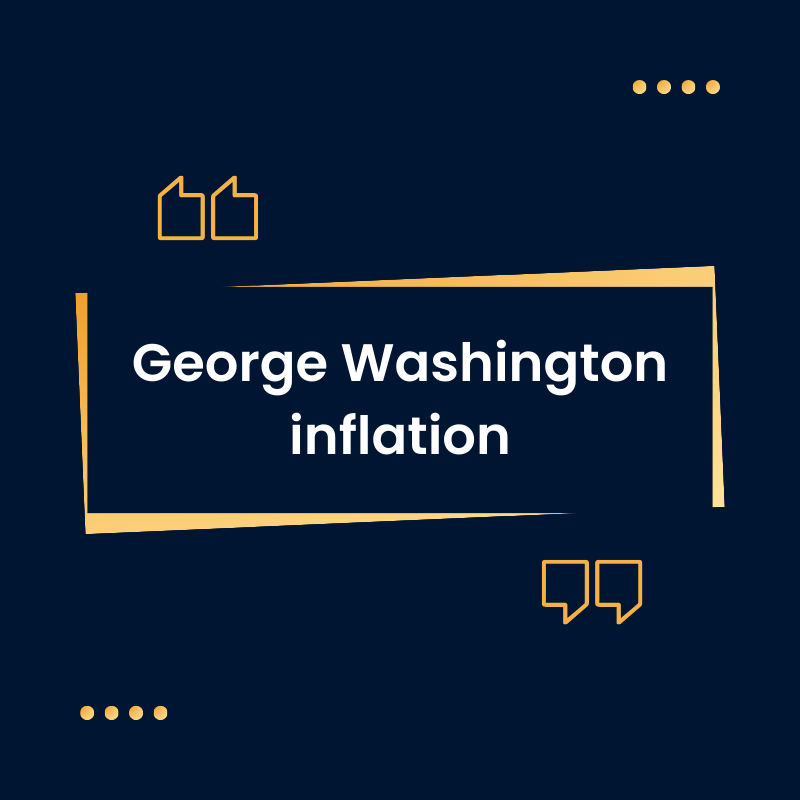Table of Contents
George Washington Inflation. In the historical context of George Washington’s presidency (1789-1797), the topic of inflation did not directly find its way into his known writings or speeches. As the first President of the United States, Washington steered the nation through its nascent stages of development when inflation, as we recognize it today, wasn’t a prominent economic concern.
Washington’s focus in his writings and speeches centered around pivotal issues such as the formation of the new nation, governance, foreign policy, and his leadership role. Consequently, there exists no specific statement or quote from George Washington addressing the concept of inflation.
Delve into the historical nuances of Washington’s era, exploring the economic landscape during a critical period of the United States’ foundational years. While inflation may not have been a central theme in his discourse, understanding the broader context offers insights into the economic considerations of the time.
Perspectives of the Founding Fathers: George Washington Inflation Considerations
During the era of the Founding Fathers, the term “inflation” did not exist in the same context as it does today. Economic discussions revolved around different terms, yet some of the Founding Fathers did express concerns about economic stability, currency value, and related topics.
Thomas Jefferson
The author of the Declaration of Independence and the third President of the United States, Jefferson, exhibited wariness toward excessive government debt. He advocated for a limited federal government role in economic matters, favoring a strict interpretation of the Constitution and maintaining suspicion of a robust central bank.
Alexander Hamilton
As the first Secretary of the Treasury, Hamilton championed the establishment of a national bank and endorsed a strong federal government role in economic regulation. He believed in the stabilizing impact of a national bank on the economy and currency value, aiming to prevent financial instability.
James Madison
Often referred to as the “Father of the Constitution,” Madison expressed concerns about potential economic instability arising from state-issued paper money. He advocated for federal government power to regulate currency, preventing states from issuing potentially inflationary currencies.
While the Founding Fathers held diverse views on economic matters, their discussions primarily centered around fiscal policy, monetary policy, and the government’s role in economic affairs. The modern concept of inflation, intertwined with central banking and contemporary economic theories, was not a central concern during their time. Delve into the economic musings of the Founding Fathers to gain insights into the foundational principles that shaped the early economic landscape of the United States.
Unveiling Benjamin Franklin’s Economic Insights: Currency and Value Preservation
Explore the economic musings of Benjamin Franklin, a prominent figure from the American Revolutionary era, with a focus on his thoughts on economic matters, including what we now understand as inflation. While Franklin did not use the term “inflation” in the modern sense, he did delve into issues concerning currency and its value.
Franklin is often credited with the renowned saying, “A penny saved is a penny earned.” This timeless aphorism reflects his profound understanding of the significance of preserving the value of money and practicing frugality. The underlying notion is that by safeguarding money from depreciation, one effectively “earns” more.
In his writings, Franklin delved into the adverse effects of excessive printing of paper money lacking sufficient backing, recognizing the potential for a decrease in its value. His insights highlighted the importance of maintaining currency stability and trustworthiness.
While Franklin may not have presented detailed economic theories on inflation, his writings and sayings suggest a keen awareness of the significance of sound monetary policy and the repercussions of currency devaluation. His practical wisdom and economic insights remain relevant in contemporary discussions about financial responsibility and the enduring value of money. Delve into Benjamin Franklin’s perspectives to glean timeless lessons for navigating the realms of fiscal prudence.
Also read: Potato Galette: A Culinary Delight to Savor



